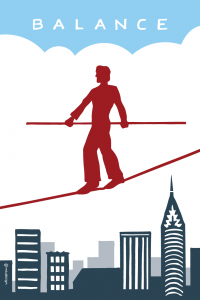
In
the world of start-ups, entrepreneurs love to wear the 60+ hour work week like a badge of honor. In publications and blogs devoted to entrepreneurship, you’ll read countless stories that make you feel you should work around the clock, never leaving
your office.
There are a lot of entrepreneurs and their employees who have been extremely successful operating this way. The problem is, it’s not sustainable. Few people can keep up that kind of schedule for months and years on
end and still have meaningful relationships with the important people in their lives. It’s also unrealistic to expect employees to make this kind of ongoing investment of their time (their lives, really) in a business that’s not their own.
Expectations of long hours on a continual basis will eventually burn out your team and diminish productivity and creativity. If you serve in a leadership role within your company, it’s up to you to set the tone with your own ability
to create balance in your life.
We discussed Far Reach Core Value #9 – Balance – with our team in a weekly Huddle. We warmed up the discussion watching a TED Talk by Nigel March:
Nigel describes losing his job mid-life and how this loss offered the opportunity to completely rethink his priorities and work-life balance. It’s a hilarious account of his own process and struggle to mold his
life into his ideal.
We also raised the questions: Is the real discussion even about creating a work-life balance? What about integrating the two? Louisa Leontiades describe this idea in
a blog post and claims blurring the line between work and personal life can create a happier existence, allowing an individual to focus on the right priorities at the right time.
As a team, we discussed what an “ideally balanced” day or week looks like. For some, it would be working 20 hours per week, some 30, some 40 or more. Many of us agreed that the number of hours isn’t the key but, rather, flexibility.
In order to accomplish our maximum level of productivity, it may mean the flexibility of working from home occasionally, working during the times of day when we’re most productive, or working around other issues that need to take priority for the
short term (kids’ events, volunteer commitments, family illnesses, etc.)
In the long run, we really believe as a company that this type of flexibility and integration of work into life nets a higher level of happiness
and productivity
for our employees.
Regardless of where you believe your personal level of work-life balance lies, research shows there’s no getting around the fact that we all need to take breaks from work.
A recent article in The Atlantic describes how productivity diminishes rapidly once you’ve worked more than 40 hours in a week. The article’s conclusion:
The bottom line is that breaks are better for our brains than overtime. Where you get your break – from an hour on blogs, a day in the park, or a week golfing at Martha's Vineyard – doesn't matter so much as that you get it. If you care about your own productivity, don't be afraid to goof off online. And if you care about decision-making at the national level, go work on your golf game.
How do you manage work-life balance on a personal level or with your employees? We’d love to hear your thoughts on this issue in the comments below.